Custom manufacturers rely on equipment that multitasks across product lines and markets, with minimal downtime.
by Maura Keller
Even before the COVID-19 pandemic, every custom end-product manufacturer faced some type of financial challenge. Reduced or canceled orders, customer attrition and market changes always affect manufacturers’ bottom lines. Another commonality among manufacturers is their heavy dependence on reliable equipment to design and manufacture products that keep customers satisfied and motivated to place additional orders.
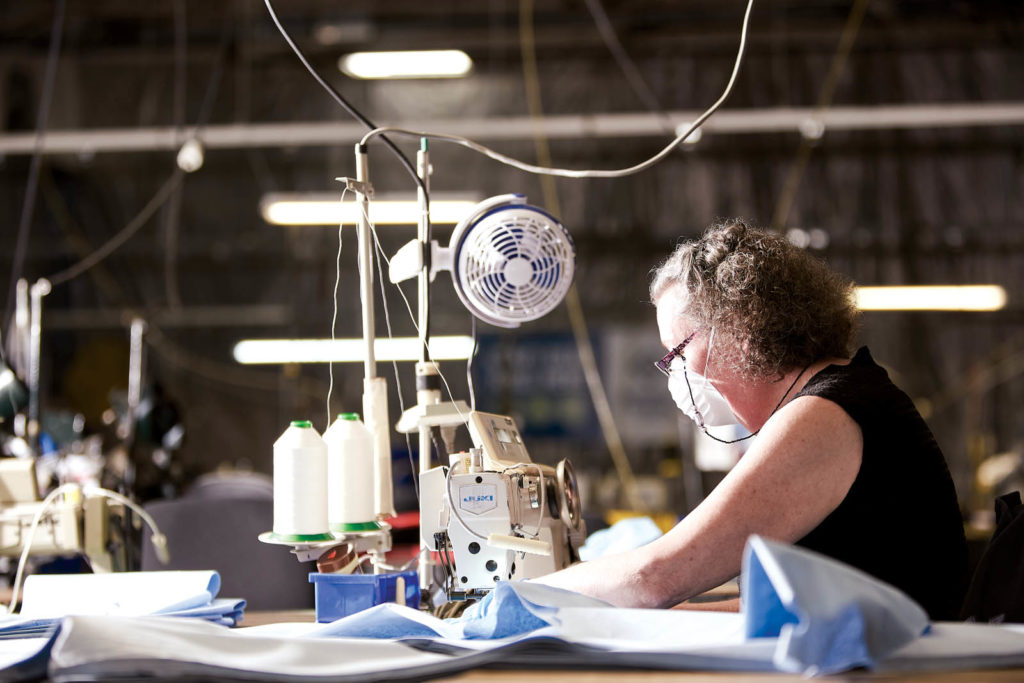
The markets that Creative Textile Solutions Ltd. in Halifax, N.S., Canada, typically serves fluctuate depending on customer requirements, seasonal conditions and unexpected situations. The team at Creative Textile Solutions has realized that a quick response to fluid market conditions is critical to success.
“Some areas increase, some decrease due to economic and market conditions, and this is likely to continue as we find ourselves in increasingly turbulent times,” says Paul Aumento, president of Creative Textile Solutions, a custom manufacturer of value-added textile products including awnings and canopies, tarpaulins, custom covers, environmental control products, bags and marine covers. The company serves residential, commercial, industrial, marine, military and government markets; it also offers finishing for display and specialty fabric items and provides installation, design and repairs.
“We’ve always prided ourselves in being able to provide a quality end product at competitive rates,” Aumento says. “This approach has provided us with sustained growth and market share for all our target markets.” For example, the growth of wide format digital printed media has led to increased finishing of these wide-ranging products. Increasing environmental awareness and the implementation of strict guidelines also has increased the company’s production of environmental control products including turbidity (silt) curtains, related filter bags and debris containment. To meet the needs of these growing yet diverse markets, Creative Textile Solutions depends on equipment that serves multiple purposes and increases efficiencies.
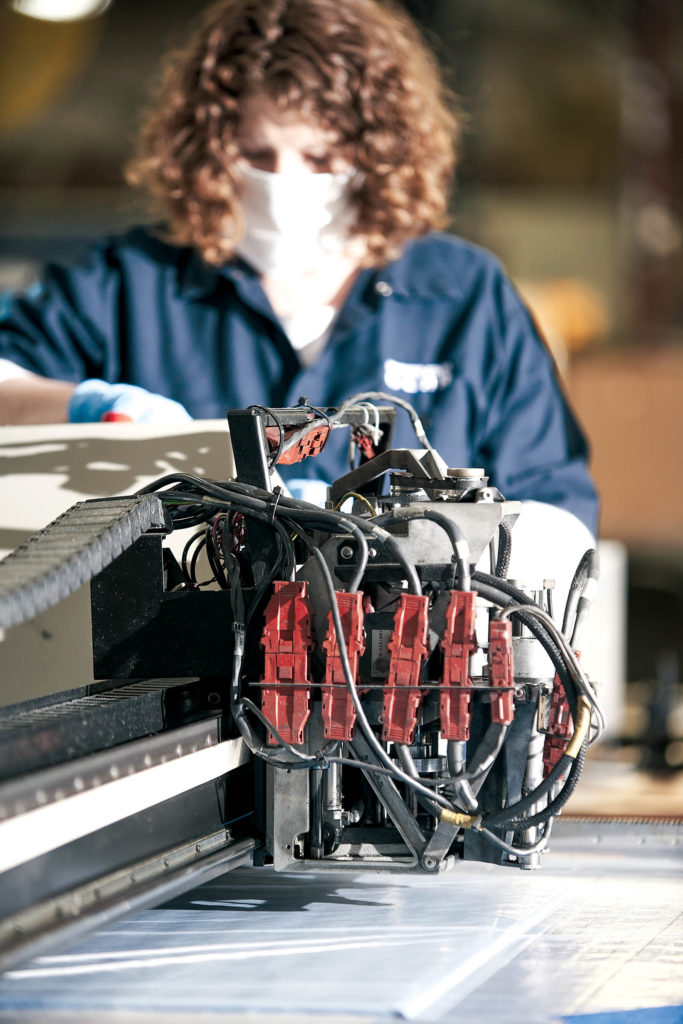
Streamlined operation
“We pride ourselves on using the best materials and making products that can be passed down. This is in line with our product ethos and also reflects our passion for sustainability,” says Bradlee Hicks, marketing director at Diamond Brand Gear Co. “We want to see our products enjoyed for a lifetime, not discarded.”
Located in Asheville, N.C., Diamond Brand Gear manufacturers Diamond Brand products like tents and travel bags, as well as contract manufacturing products like helicopter and military equipment covers, first aid bags, backpacks and personal protective equipment (PPE) for medical professionals.
To service its expanding client list, Diamond Brand has embraced a robust sewing capacity and has the ability to do large-scale computer numerical control (CNC) cutting. “We are always investing and looking for the best equipment to get the job done easier and quicker,” Hicks says. “We prioritize any and all efficiencies so we can enrich our team members via our monthly revenue sharing program. The more streamlined our operation is, the more we are able to share with our workforce.”
The equipment required to produce Creative Textile Solutions’ products also is varied, with some units being product specific. However, the majority of the company’s equipment meets a variety of production requirements.
“We utilize single- and double-needle sewing machines, zig-zag sewing machines, pneumatic automatic and hand grommet tools, thermal hot-air fabric welders, hand and electric cutting tools,” Aumento says. “We also have a full metal fabrication division with metal welders, cutting equipment and bending tools.” The company also uses assorted tools for installing snap fasteners, binders and trimmers.
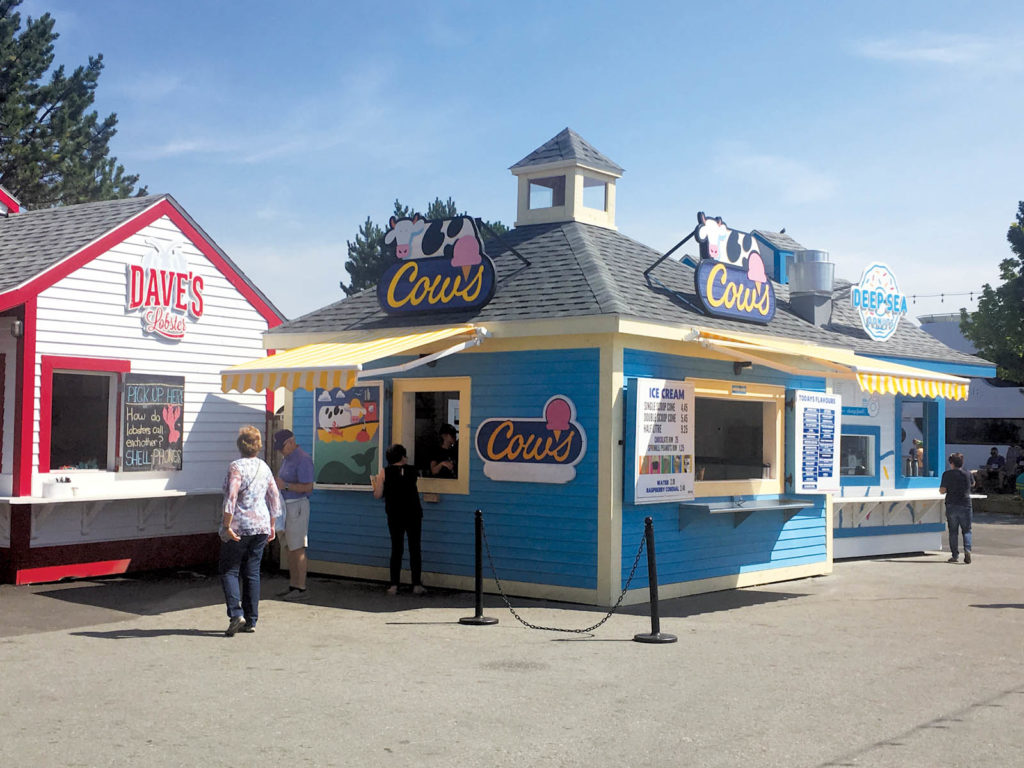
“We are always looking to increase the efficiency of our production whether by way of tools and/or technology,” he adds.
When considering an equipment investment, the company values the ability to operate with minimum down time and repairs. Located in eastern Canada, the company does not always have immediate access to replacement parts or technical service. A combination of scheduled maintenance and reliable equipment means that, barring a catastrophic and unexpected failure, the company operates smoothly at all times.
“The versatility of our equipment allows for crossover production as needed,” Aumento says.
Based in Chicago, Ill., Bearse USA manufactures bags, packs, and other sewn accessories for military, tactical and outdoor equipment markets. Tom Auer, president of Bearse, credits ongoing innovation in fabrics as well as the equipment and processes his team uses to assemble quality products.
“For instance, laser cutting of textiles has really grown in our industry,” Auer says. “This allows the end product to be lighter and more durable.”
Bearse utilizes CNC and laser cutters as well as hundreds of sewing machines. “Our machines fortunately have a pretty long life when you take care of them, but it does require continued reinvestment over time,” Auer says. “Seam welding machines have been on our radar lately. The challenge is that it takes a lot of machines to produce in high volume, and they are limited in the types of textiles they can work with.”
Evolving markets
Industrial sewing markets are continuously changing, requiring equipment that can serve multiple purposes. Such is the case at United Manufacturers Inc., Fond Du Lac, Wis., according to president Jeff Faris. United Manufacturers originally produced camouflage for hunting and outdoors stores; gym bags, gym uniforms, pencil cases and bags for schools; wedding bridal and bridesmaid gowns; wheelchair covers and accessories; and lift table safety skirts. “Recently, we expanded our production to manufacture cloth filtered face masks and hospital gowns to help aid in the prevention of COVID-19 spread,” Faris says. “We expect the market to continue to change as the health standards change with more manufacturing brought back to the U.S. from overseas.”
United Manufacturers serves a wide range of customers, from large global manufacturers to small businesses and new entrepreneurs. Among its specialties are accordion-style lift table safety skirts and bellows. These meet OSHA standards and specifications for lift tables and scissor lift machines in manufacturing facilities.
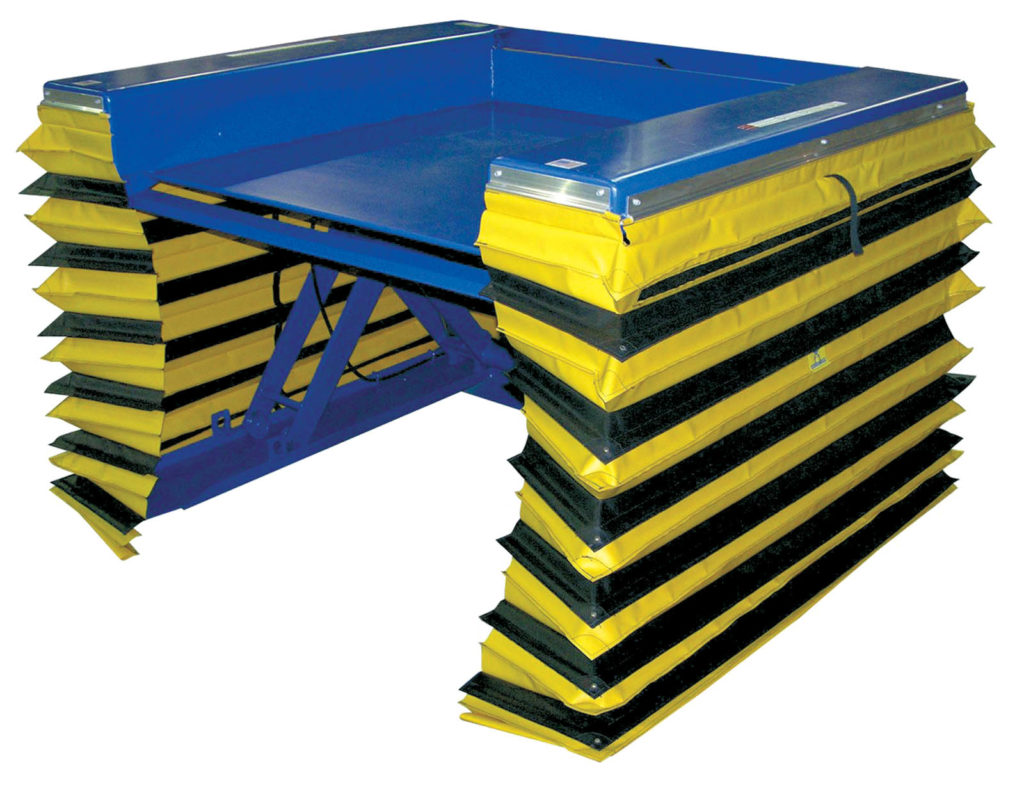
“There is an increase in orders due to current economic demands,” Faris says. “For example, food manufacturers and distribution centers, where our safety skirts are used, are increasing capacity due to American demand for products with the current COVID-19 circumstances.”
At Precision Technical Sewing (PTS) LLC, Mountain Ranch, Calif., all products meet engineered specifications and most require specialized materials. These include sewn parts for surgical robots, covers for technical equipment, sewn specialty parts for research equipment and a variety of covers for the tech field.
“Many of our contracts are with companies that are developing and producing circuit boards, smart screens, LED technology and solar tech,” says Lisa Rhody, production manager at PTS. “Some of what we make aids in manufacture, some is dedicated to research and development.”
The markets that PTS serves are evolving all the time, which ultimately leads to the need for adaptations in the equipment used. The company uses a robotic cutting machine and several medium and heavy industrial machines.
“Fortunately, our machines were all designed for decades of functionality with routine maintenance, and we’re really happy with the longevity and functionality of the equipment,” Rhody says. “We upgrade technology as necessary and would like the equipment used on this side of the business to be more reliable and durable.”
That said, Rhody notes that there’s been a steady push for new and innovative technology in the tech field; improvements include memory, computing speed, access, miniaturization and specific forms of robustness or durability, like waterproofing technology and less brittle, friable glass for touch screens.
What the future holds
COVID-19 has illuminated the importance of manufacturers, especially custom sewing manufacturers. “Perhaps people may begin to put more value into trade skills, such as sewing, and be more open to working in manufacturing settings,” Faris says. “I also believe the need and desire for U.S.-made products is going to drastically increase, and quickly. Corporations will start sourcing from U.S. manufacturers for quality and efficiency, rather than going overseas for a better price.”
Auer predicts increased automation in sewing processes. “But the dexterity of a human hand combined with our eyesight still beats a robot today,” Auer says. “The sewing robots of tomorrow will need the flexibility to take on a variety of tasks before they can make a significant impact on our industry. There are thousands of people across the globe who sit down at a sewing machine every day, and it’s not likely to change very soon.”
Maura Keller is a freelance writer based in Plymouth, Minn.
SIDEBAR: Avoiding downtime
End product manufacturers that offer custom fabrication for a range of industries need a variety of equipment to get the job done. But buying and maintaining that equipment is expensive. That’s where Kamber Narrow Fabric Machinery LLC, Birmingham, Ala., comes in. As David Giltz, sales manager at Kamber explains, the company is a reseller and repairer of narrow fabric textile equipment in North America.
“We build machines to any specification a client may have and sometimes recommend uses they haven’t even considered yet,” Giltz says. “That allows our clients to change quickly from what they currently produce today to what they know the market will want tomorrow.”
Kamber’s “Hot Swap” program helps businesses repurpose or repair their equipment without any downtime. As Giltz explains, Kamber prepares one of their narrow fabric needle looms to do the job a manufacturer may need—whether that’s the same job of a current machine or one with new tasks that the manufacturer specifies. Kamber brings its loaner machine to the customer’s factory and swaps it out with the one needing repairs.
“Your production line never goes down while we completely refurbish your narrow fabric needle loom,” Giltz says. “When your refurbished or newly equipped machine is ready, we swap it right back into your factory and take away the loaner we provided. Thanks to Hot Swap, our clients never go offline and production never misses a beat. And modifying machines to accomplish tasks they never could before opens up entirely new markets, again at a fraction of the cost of purchasing a new, untried piece of equipment.”
SIDEBAR: Airtex reacts to market changes
The Airtex Group, Minneapolis, Minn., is a custom textile manufacturer that designs and manufactures products ranging from high-end linen draperies, pillows, throws, soft-sided furniture and bags, including backpacks and computer sleeves under its own brand, Acme Made.
Historically, Airtex generates about 50 percent of its revenue from its Minneapolis factory, and the rest is produced by partners primarily in Cambodia, Vietnam, India and Taiwan.
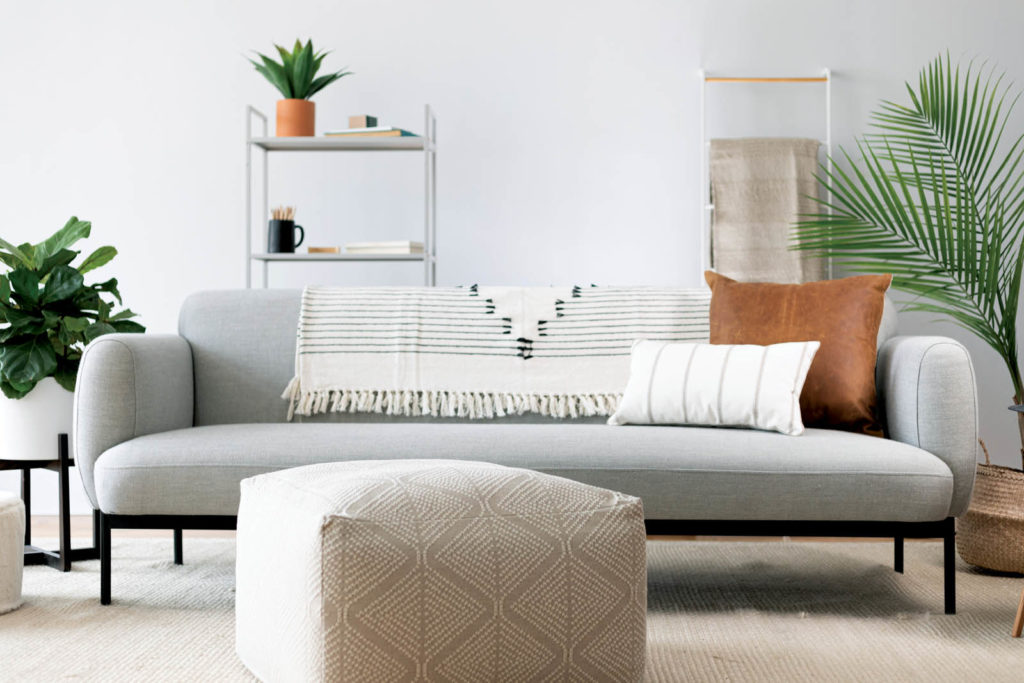
The markets that Airtex serves were changing even prior to the global pandemic. According to Michael Noer, president of Airtex, prior to the pandemic, the trends they were seeing included personalized products, consumers’ higher awareness and appreciation for recycled and upcycled products and the willingness to pay for U.S.-made products.
“Now, we expect those trends to strengthen, especially the desire to understand where the products come from, and based on feedback from our customers, a preference for U.S.-made goods,” Noer says.
The company boasts three key markets including private label retail, business to business (B2B) customers and the Acme Made brand. The private label retail business includes soft furniture, window, bags, pillows and throws. The B2B business includes industries such as medical, automotive, aeronautics, outdoor gear, manufacturing and now, not surprisingly, personal protective equipment (PPE).
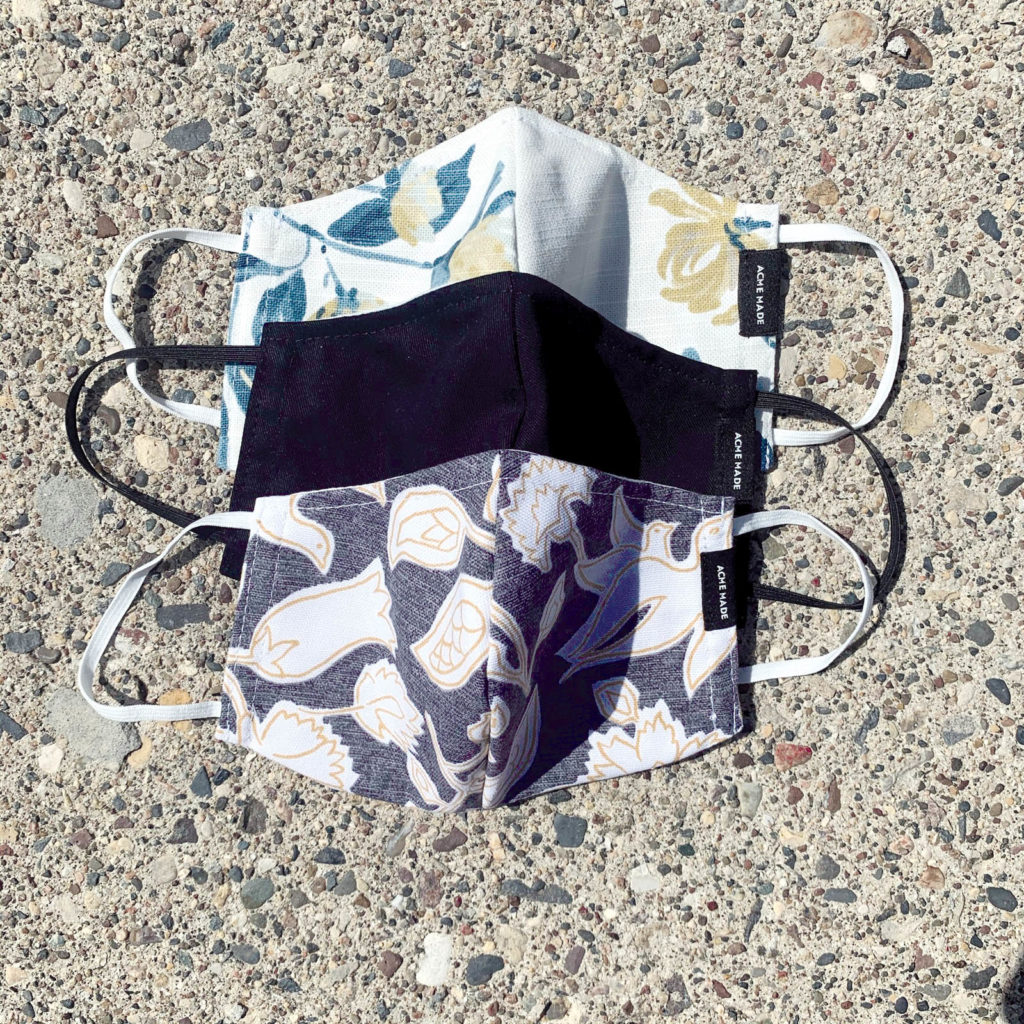
The biggest challenges Airtex faces now include addressing the massive demand for PPE gear, prioritizing goals and sticking to the company’s core values by balancing doing good with continued growth.
“I believe that the renewed interest in U.S. manufacturing will provide a platform for growth,” Noer says. “Whether specific to PPE gear, fast-to-market customized products, understanding the source of raw materials—and therefore sustainability—or just that, philosophically, people are asking more about what can be done in the U.S. specific to the textile industry, that could lead to consolidation in the industry to address higher demand and the need to be more efficient.”
 TEXTILES.ORG
TEXTILES.ORG


